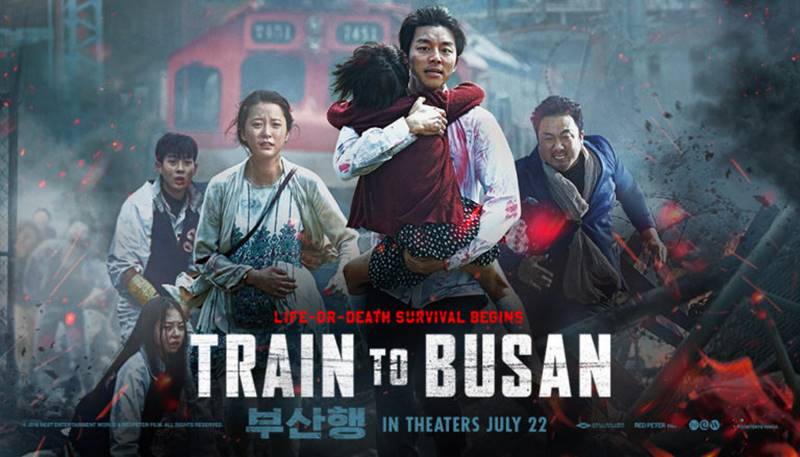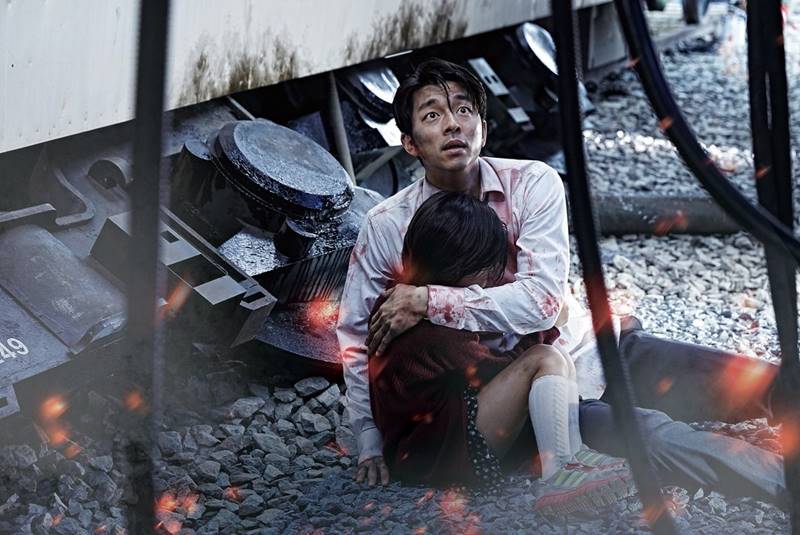
By Jae-Ha Kim
Substack
May 4, 2020
![]()
Seok-Woo (played by Gong Yoo)
Sang-Hwa (played by Ma Dong-Seok)
Yong-Guk (played by Choi Woo-Shik)
↑Note: Korean names denote the surname followed by the given name.
“Train to Busan” is a sociopolitical film disguised as a zombie horror thriller. Watching it in 2020 when much of the world is dealing with the coronavirus pandemic, the film had added meaning as to who and what are to blame for the unexplainable.
Seok-Woo is a successful funds trader who lives with his mother and young daughter, Soo-An (adroitly portrayed by Kim Su-An). Lonely at home and missing her mother, she tells her father she will travel to Busan by herself so she can spend her birthday with her mom. Busy with work and not wanting to take a day off, Seok-Woo begrudgingly agrees to accompany his child. They board the high-speed KTX train and … that’s where everything happens.
In this world of have and have nots — with the rich sitting in first class and the less rich sitting in the less-nice cars — two people board who don’t belong on the train. One is a frightened vagrant rambling bits and pieces about having seen everyone die. The other is a young woman with glassy white eyes who is convulsing. What the passengers don’t know is that like thousands of others, she was somehow contaminated by a leak from a bio-chemical factory. The result? Zombies, that can create more like themselves by biting into people’s flesh.
As some passengers rally to have the indigent man kicked off the train, others scramble to help the woman. After she attacks and bites a car attendant, all hell breaks loose. The passengers are now trapped on a train speeding along at about 200 miles per hour, with zombies begetting more zombies. And unlike the zombies of yore, these creatures are lightening fast.
Luckily, they’re not very bright. Though they will fight as hard as they can to attack humans, they don’t know how to unlock closed doors. They also don’t do well in the dark. If they can’t see their prey, they don’t attack.
There are some astounding moments juxtaposed together. As passengers watch in horror as zombies attack passersby outside, a politician appears on TV telling the public to stay calm … that everything is under control … and not to believe all the unsubstantiated rumors floating around. They’re being told not to believe what they’re witnessing with their own eyes.
While most passengers go into fright or flight mode, Seok-Woo’s priority is keeping his daughter alive. He teams up with muscular father-to-be Sang-Hwa and high school baseball player Yong-Guk to figure out how to escape the zombies. In true action-hero style, they each have a female to protect: Sang-Hwa’s pregnant wife, Seong-Kyeong (played by Jung Yu-Mi, the star of 2019’s “Kim Ji-Young, Born 1982”); Yong-Guk’s sweetheart, Jin-Hee (played by former Wonder Girls‘ Sohee); and little Su-An.
But though it seems the women are waiting for the men to rescue them (and they often are), there are small moments that give a glimmer of what the female characters could’ve done. Seong-Kyeong gets pro-active, sticking newspapers on the glass doors so the zombies can’t see them. Jin-Hee was familiar with the baseball world. I kept waiting for her to pick up a bat and take action. Sadly, that never happened.
The film did a great job of depicting how people deal with death during unthinkable times. When your loved one is infected and your only option is to perish (as a human being) with them or kill them so that you (and others) can survive, what would you do?
Meta moment: Gong Yoo fans should check out “Goblin,” when his character goes on a date to the movies. Their film of choice? “Train to Busan.” His titular character turns out to be a bit of a fraidy cat who screams throughout the movie.
Release date: After premiering at Cannes on May 13, 2016, the film opened in South Korea on July 20.
Running time: 118 minutes.

Spoiler Alert: Very rarely does the star of the film die. But the trio of men who lead the fight against the zombies don’t survive. The vagrant also sacrifices himself so that others may live.
Kim Eui-Sung, who was perfectly evil in “Mr. Sunshine,” plays a rich muckety muck, who believes he is better than others and that he deserves to survive more than anyone else. He bosses around the train staff into getting his way. And he incites his fellow passengers into a state of paranoia that has them turning on each other. He eventually succombs to zombiehood, but not before taking a bite out of Seok-Woo, who is aware of what will happen next. He says goodbye to his daughter, who begs him to stay with her. Watching her accept the blame for all this (for wanting to visit her mother in Busan) was heartbreaking. Chances are, she was safer on the train with her father than at home with her grandmother, who, incidentally, got bit. Seok-Woo hugs her and tells her to stay with Seong-Kyeong and then he throws himself from the train. The film ends after Seong-Kyeong and Su-An walk through a tunnel, where they are met by armed military.
One of the most memorable parts of the film came near the end, when two elderly sisters are separated. One makes it back on the train to safety. The other has become a zombie. As the human sister watches her fellow passengers turn on each other — banishing a small group out of fear that they may have been infected — she looks at the group of zombies that has infiltrated the train. She spots her sister and slowly opens the door. The scene seemed nonsensical at first. Why would she willingly become a zombie? To me, it was a sign that she saw no difference between the zombies and some of her fellow passengers, who were willing to let others die to ensure their own safety. Neither valued human life.
© 2020 JAE-HA KIM | All Rights Reserved
6 thoughts on ““Train to Busan” (부산행)”